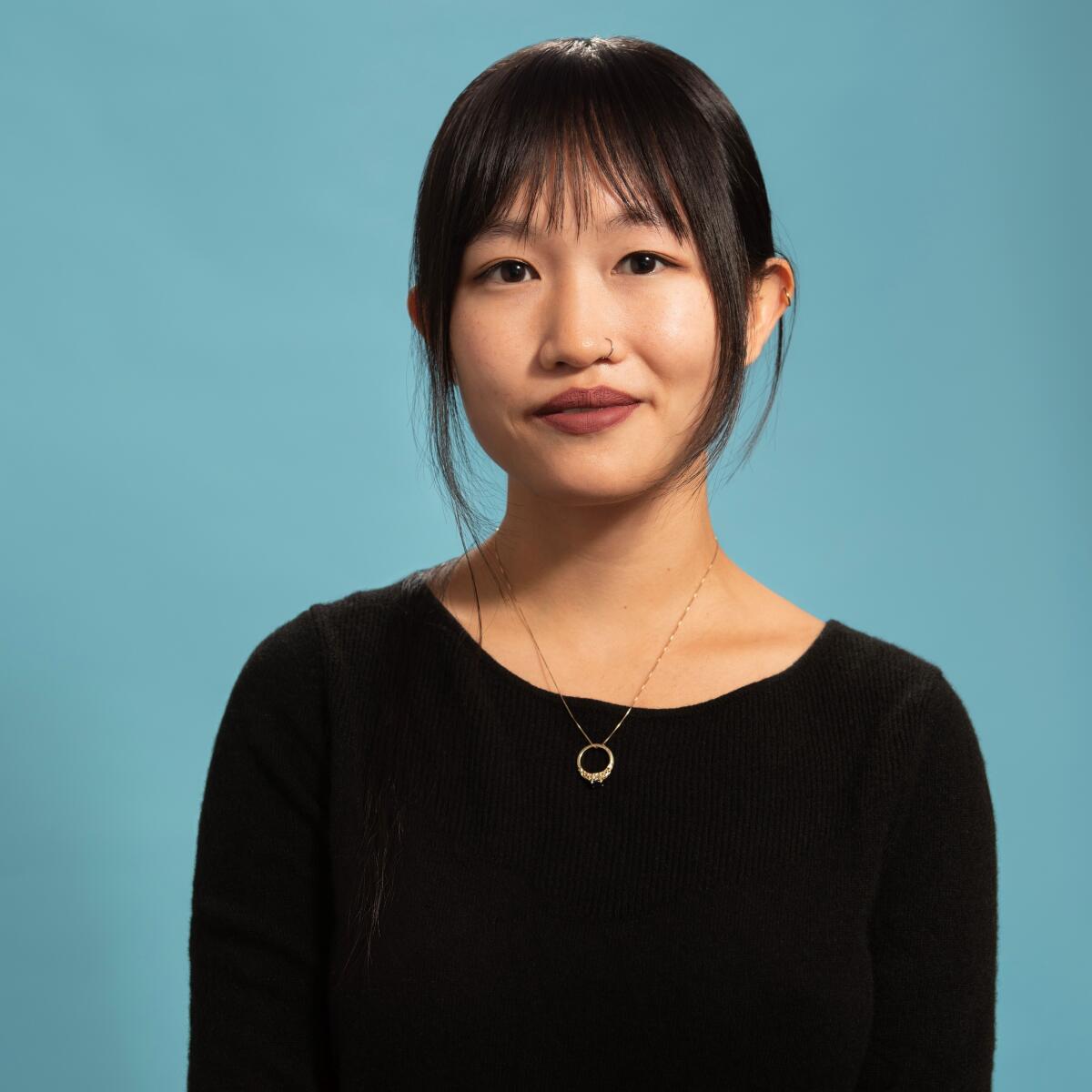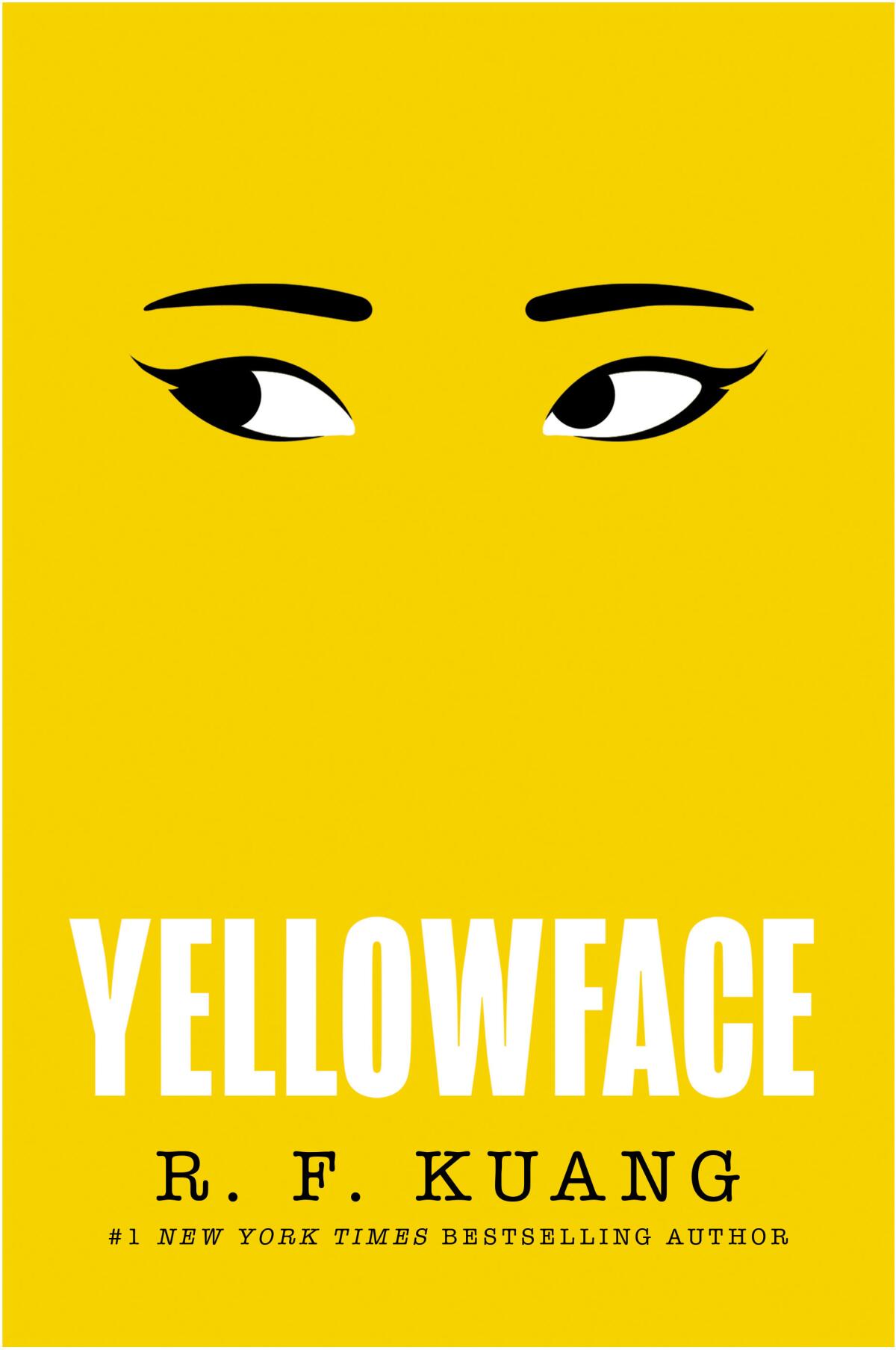Sign up for our Book Club newsletter
Get the latest news, events and more from the Los Angeles Times Book Club, and help us get L.A. reading and talking.
You may occasionally receive promotional content from the Los Angeles Times.

On the Shelf
Yellowface
By R. F. Kuang
William Morrow: 336 pages, $30
If you buy books linked on our site, The Times may earn a commission from Bookshop.org, whose fees support independent bookstores.
R. F. Kuang, 26, is hardly a debut author. She has already published four fantasy novels infused with Chinese history and profound questions about colonial legacies, including the “Poppy War” trilogy and last year’s bestseller, “Babel, or the Necessity of Violence.”
But Kuang’s new novel, “Yellowface,” out Tuesday, is both a departure and a quantum leap straight into the zeitgeist. A dark satire on the publishing industry and the many-layered ironies of public discourse around Asian American representation, it starts with a first-chapter twist.
When rising-star novelist Athena Liu dies suddenly, her fellow writer and frenemy June Hayward is right there to pick up the pieces — or rather, to steal Athena’s manuscript, a saga involving Chinese laborers during World War I. June, who is white, publishes it as her own, but under a new, racially ambiguous name — Juniper Song. She scores a big book deal and rides a wave of “own voices” storytelling in ways that make you question everything.
Steph Cha shares a meal and some notes on performing identity with the “Interior Chinatown” author.
Talking via phone with Kuang felt like finally divulging secrets we’ve all known. As an Asian American journalist, I’ve felt pressures similar to those Kuang explores. I too have wondered if I’m in demand to tick diversity boxes. I too have learned to package myself as a minority voice for white audiences — sometimes unintentionally pigeonholing myself. I too wonder if I’m participating in a machine that claims to redistribute power only to tokenize. In “Yellowface,” I saw my worries on the page.
Speaking from New Haven, Conn., where she is pursuing a PhD from Yale in East Asian languages and literature, Kuang admitted with delight that “every single thing that happens is based on a real scandal.” Folding in everything from the “American Dirt” controversy to the “Bad Art Friend” debate was part of the fun of writing a novel whose dizzying absurdities — oh, and a few ghosts — are still no match for reality.
Our wide-ranging conversation, covering scandals, cultural appropriation and the scourge of social media call-outs, has been edited and condensed for clarity.

What was the inspiration for this story?
It was mid-2021, so everyone was sitting at home. A lot of writers I know were in their goblin mode. The novel just plopped fully formed into my head one morning, which is not a super helpful way to understand where creative inspiration comes from.
Publishing was going through what seems like all these watershed moments, having conversations about change and diversity and caring about marginalized writers, et cetera, and I was feeling a bit cynical about it, especially because it seems like very few of those promises have actually come to fruition. So I was thinking about ways in which the industry capitalizes on performative care about diversity and uplifting marginalized voices [while] not ever changing in a structural way.
You’ve just alluded to the diversity pushes that followed “American Dirt,” but you also joined a strike against your publisher, HarperCollins. How much are the plotlines in “Yellowface” shaped by these scandals?
We’ve been pitching it as kind of an absurdist satire of the industry, but on the level of social realism, and it doesn’t even get close to describing the ridiculous things that happen day-to-day. There are so many Junes in publishing, and the things they are doing to each other are much, much worse than what June individually does. “Yellowface” was very much directly influenced by stuff that was happening in publishing.
I’m very hesitant to take credit for any one thing I did helping out the strike; I think a lot of HarperCollins authors showed up. Obviously the people who deserve credit are [people] in the union who went without pay and put their whole livelihood and careers on the line.
Celebrities endorsed ‘American Dirt’ — then the reactions on Twitter turned negative. Cries of appropriation — and barb-wire dinner pieces — spark scorn for book
You describe June and Athena as “friends through circumstance.” Is their relationship anything you’ve experienced in writing communities?
I don’t think writing friendships are any more vicious or intense than everyday friendships. But in any industry that feels intensely competitive, we do a lot of clique forming and name-dropping and petty gossip. June and Athena are the only two professional writers that the other knows, so they stick together, even though they really despise each other. I’m fortunate in that my writing friendships are much healthier and mutually supportive.
While editing Athena’s novel, June is trying to preserve an Asian writer’s ideas but not really understanding the personal elements. When some “offensive” things get cut to make her material more accessible, she’s complimented by her editor for killing her darlings. It looks virtuous, but it’s actually whitewashing. Is that a pressure you have ever felt in your career?
I used to feel this pressure a lot more. I think I used to really not get along with my editor who edits my fantasy novels. I would feel all the time I was being pressured to whitewash the story to make things accessible. And the lovely thing about that relationship is that we’ve grown together. I’ve learned to figure out what works about my editor’s feedback and what doesn’t, and also to advocate for myself and explain where I’m coming from, what changes I absolutely can’t make. So I don’t struggle with that as much now, but that’s because I’m much more confident and mature in the editorial relationship.
Before I read the book, I found people who had read the advance copy on TikTok. They were saying: “Oh, my gosh, this protagonist is so terrible!” But sometimes, June says things I have been thinking about but have been afraid to say for fear of calling out my own community.
You’re supposed to feel for June. That’s the whole hat trick, right? Even when you’re writing the villains, you want somebody whose motivations are sometimes understandable, whose logic is right maybe 60% of the time. She’s just so badly wrong about the other 40%. And the thing is, I think we all can relate to June harder than we can to Athena, because in this industry most of us are Junes. Very few people are overnight celebrity bestsellers. The beginning of my career certainly looks a lot more like June’s career, so I felt her pain. So yeah, you’re supposed to uncomfortably like her, even though she does progressively unhinged things.
There’s a social media storm in the novel that felt very real. Have you ever had the fear of generating backlash?
I don’t think that much about social media backlash. Can’t think too much about it. I don’t think it’s a matter of personal safety for me so much as it is a matter of nuance and care. And what frustrates me about conversations where people are supposedly calling each other out is that it often seems to come less from a place of genuinely wanting to work through thorny issues — instead of doing this work, people tend to just take sides, use very reductive language to describe what’s going on. And I don’t find that helpful for anyone. It’s not good for the community.
Before it whisks you off on the sunniest, most extravagant Singaporean holiday imaginable, “Crazy Rich Asians” begins on a curiously dark and stormy night.
But I mean, for instance, I thought that there are some wonderful critical pieces of this film “Crazy Rich Asians” that were able to acknowledge how much it meant for a lot of people to see themselves as the protagonist of rom-coms while also criticizing the many things the film gets wrong. This kind of conversation is only possible if you don’t have a binary mentality. You can love this thing and criticize it at the same time.
Throughout “Yellowface,” we see how trauma can become very profitable for the market. You can even profit off being ”canceled.” In your publicity material, you said, “If anything, the system only turns critique into another way of profit.” At the same time, of course, you are part of that system. Did you ever wrestle with that irony?
It doesn’t seem like a terrible contradiction to me, because what was the alternative? Not saying anything at all? I just refuse to publish anything, keep my silence? I think that would be worse. So even though the system, I believe, always swallows its own critiques, there’s still another benefit to publishing stories like this — just that it gets us talking. It gets Asian American writers discussing ways in which we can show better solidarity for one another. It lays a lot of ugly things about publishing out in the open so that maybe writers know what they’re getting into.
At heart, this feels like a story about who gets to tell whose story. Not just another group’s story, but another person’s. Athena used people’s stories in her fiction, June then used her research — on and on. What does it mean to ask for “consent” to use someone else’s experience in fiction?
Obviously, there are lots of different viewpoints on this. The story “Bad Art Friend,” which was circulating around certain parts of Book Twitter a while back, really revealed that people have very differing attitudes on what you can lift from the people in your life. There’s some people who think that anything is fair play, as long as it’s fiction. You can grab other people by the ankles and shake them for the pocket change of their life experiences. And maybe that’s completely permissible from the perspective of making great art. I think it makes you kind of an a— to the people around you if you don’t talk to them about it.
I’m very hesitant to impose hard and fast standards on what people can and can’t write about. That being said, I probably would not write about my friend’s experiences in the way Athena was. But that’s a matter of being a bad friend and a bad writer.
She threw a welcome party for herself at the Ace Hotel in downtown Los Angeles, a beautiful old building with black and white marble, Alice-in-Wonderland floors.
You have been writing fantasy novels for years. What made you want to do something different?
I love different playgrounds, I think I’ll try to keep hopping genres. As long as I have the career, I hate doing the same thing twice. Maybe I’ll do a rom-com. Maybe I’ll do a hard-boiled mystery novel. Maybe I’ll do a psychological thriller. I don’t know.
Well, June’s work gets optioned by Hollywood. Would you want to do that?
Everything I’ve heard about Hollywood makes me deeply anxious about ever heading over there. And so I have no immediate plans to, since I have to finish my PhD first.
And you’ll also have to go on a 10-city book tour for “Yellowface.” What are you most excited — or anxious about?
I’m anxious about my laundry. It’s really hard to wash your clothes from your city every week or every day. So I’m not sure how I’m going to have clean underwear for the entire tour. I really need to figure that out.
Sign up for our Book Club newsletter
Get the latest news, events and more from the Los Angeles Times Book Club, and help us get L.A. reading and talking.
You may occasionally receive promotional content from the Los Angeles Times.